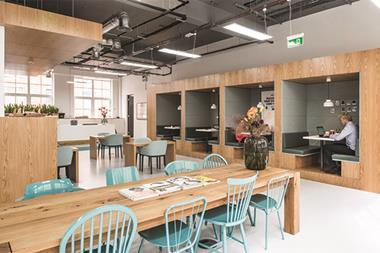In June, private equity giant Blackstone announced it had bought a majority stake in flexible workspace provider The Office Group.

This news came just a week after US private equity fund Carlyle acquired three London buildings to use as flexible workspaces.
Institutional investor interest in the serviced office market has mirrored moves by major traditional landlords such as British Land - which announced its own flexible office brand earlier this year - looking to capitalise on the rapid expansion of the serviced office market.
These developments have triggered speculation they will be the catalysts for a sustained flow of institutional investment into the sector. While this looks likely, the serviced office sector needs a standard valuation approach accepted by the market for it to emerge as an asset class in its own right.
Unfounded Brexit fears
Brexit fears about the future performance of the UK commercial real estate (CRE) sector, with offices a large component, have largely been unfounded. UK CRE continues to be regarded as the top destination for overseas investors looking for strong and reliable returns.
The first quarter of 2017 remained strong for the sector, which enjoyed £5bn worth of commercial real estate transactions. Retail investors, having withdrawn £1bn from property funds last year, returned to the market in the first quarter, recording a modest £52m in net retail sales.

Growth in the serviced office sector has been driven, at least in part, by the changing realities of modern business and the need for cost-efficient, flexible office arrangements. In 2015-16, occupier enquiries for flexible workspace experienced double-digit growth and the number of serviced office centres rose to 2,939, a year-on-year increase of 11%.
In London, the supply of flexible workspace has outpaced the rest of the UK, growing at 25% annually in recent years. Demand for office space remains particularly strong in certain sectors, with the tech and creative industries in particular continuing to drive demand in 2017, according to CBRE.
Currently there is no consistent valuation method that has been accepted across the industry
Expert bodies and think tanks are also optimistic. A recent independent report by Capital Economics and Nottingham Trent University, which we at Office Space in Town (OSiT) supported, estimated that the serviced office sector is currently worth about £16bn and forecast that the market value could rise to between £62bn and £120bn by 2025.
Certainly at OSiT we have seen interest from a range of institutional investors, including family offices, global real estate funds and Asian institutional investors. To date, we have attracted about £100m in funding from institutional sources, including global real estate investment and asset management firm Forum Partners and leading Chinese real estate asset manager Kailong.
As the sector’s growth has attracted institutional investment, calls have been made for an accepted market-wide valuation methodology for serviced offices that captures their full value based on all income streams, as currently there is no consistent valuation method that has been accepted across the industry.
OSiT is working with the RICS in the UK to develop a valuation approach that could be applied to serviced office sectors across Europe. A realisation of the true value of serviced offices would make the sector even more attractive to institutional investors.
The resulting capital injection would enable serviced office providers to further enhance the buildings they are developing to meet the rising demand for flexible office space and help UK businesses improve their performance and assist in driving the UK’s economic growth.






























No comments yet